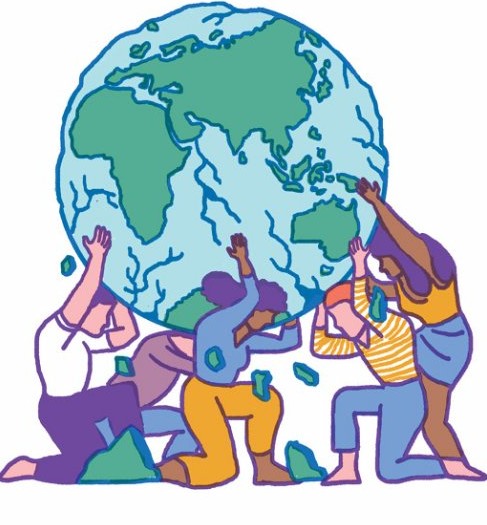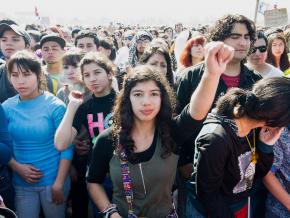'You might not see things yet on the surface, but under-ground, it's already on fire.'
Time to support youth as agents of their own future and architects of a better world

Photo:theatlantic.com
“Twenty years from now you will be more disappointed by the things that you didn't do than by the ones you did do. So throw off the bowlines. Sail away from the safe harbour. Catch the trade winds in your sails. Explore. Dream. Discover.”- Mark Twain
“You have stolen my dreams and my childhood with your empty words. We are at the beginning of a mass extinction and all you can do is talk about money and fairy tales of eternal growth. How dare you!”-Greta Thunberg, Youth Environmental Activist
A Call to Action from Our Children and Grandchildren.
We Must Not Let Them Down!
WE, THE FUTURE GENERATION, ASK YOU TO CHOOSE US
What is the unfolding story of the next decades?
The Youth of the World: Their voices will be heard
The rise of today’s youth, leading the world, with hope, inspiration, commitment, imagination and wisdom in the interest of the common good, to change our troubled world for the better

Photo:Poem: Have you heard their voices?
The commitment and the passion of young people is a force for change that cannot be matched or bettered. Today, the youth of the world have risen against injustice, inhumanity, greed, wars and conflicts, environmental degradation and abuse, values-less education, and more. By their actions, they are empowering and enabling us all to imagine and construct a better world in the interest of the common good.
We, the older generation, must become one with them. We must not let them down.
Young people speak with a directness, a moral and spiritual clarity that is extremely and desperately rare in our elected leaders, and perhaps, very sadly, in the adult species as a whole. That’s why we must praise and celebrate their contribution to a better world.
In Praise of Youth on International Youth Day- Monday 12 August 2019
The Youth of the World: Their voices will be heard
The Youth for the Common Good to Build a Better World
Global Mass Protest and Uprising against Neoliberalism, Austerity, Injustice, Inequality, Environmental Degradation and the Path to Serfdom
About 41% of the global population are under 24. And they’re angry…*
‘From Hong Kong to Chile, young people are rising up to fight injustice and inequality. Their elders should be grateful.’

Chilean students are taking to the streets in defense of public education. Photo:CHILE’S LONG HOT WINTER
‘Young women and men today must grapple with serious social, political and environmental problems inherited from their elders. Yet they are systematically excluded from policy decisions, even though young people make up one quarter of humanity. By marshalling the energy, creativity and talents of youth to address the multiple inequalities they face, we will all reap a ‘demographic dividend’ and build a fairer world.’- OXFAM+
‘A spate of large-scale street protests around the world, from Chile and Hong Kong to Lebanon and Barcelona, is fuelling a search for common denominators and collective causes. Are we entering a new age of global revolution? Or is it foolish to try to link anger in India over the price of onions to pro-democracy demonstrations in Russia?
Each country’s protests differ in detail. But recent upheavals do appear to share one key factor: youth. In most cases, younger people are at the forefront of calls for change. The uprising that unexpectedly swept away Sudan’s ancien regime this year was essentially generational in nature.
In one sense, this is unsurprising. Wordsworth expressed the eternal appeal of revolt for the young in The Prelude, a poem applauding the French Revolution. “Bliss was it in that dawn to be alive, But to be young was very Heaven!” he declared. Wordsworth was 19 years old when the Bastille was stormed.
Yet while younger people, in any era, are predisposed to shake up the established order, extreme demographic, social and political imbalances are intensifying present-day pressures. It is as if the unprecedented environmental traumas experienced by the natural world are being matched by similarly exceptional stresses in human society.

The Youth of Lebanon demonstrating against corruption, injustice and inequality in Beirut on Tuesday, Oct. 22, 2019.Photo: thestate.com
There are more young people than ever before. About 41% of the global population of 7.7 billion is aged 24 or under. In Africa, 41% is under 15. In Asia and Latin America (where 65% of the world’s people live), it’s 25%. In developed countries, imbalances tilt the other way. While 16% of Europeans are under 15, about 18%, double the world average, are over 65.
Most of these young people have reached, or will reach adulthood in a world scarred by the 2008 financial crash. Recession, stagnant or falling living standards, and austerity programmes delivered from on high have shaped their experience. As a result, many current protests are rooted in shared grievances about economic inequality and jobs. In Tunisia, birthplace of the failed 2011 Arab spring, and more recently in neighbouring Algeria, street protests were led by unemployed young people and students angry about price and tax rises – and, more broadly, about broken reform promises. Chile and Iraq faced similar upheavals last week.
Death and Destruction on Brothers’ Road to Serfdom
Neoliberalism destroys human potential and devastates values-led education
This global phenomenon of unfulfilled youthful aspirations is producing political timebombs. Each month in India, one million people turn 18 and can register to vote. In the Middle East and North Africa, an estimated 27 million youngsters will enter the workforce in the next five years. Any government, elected or not, that fails to provide jobs, decent wages and housing faces big trouble.
Numbers aside, the younger generations have something else that their elders lacked: they’re connected. More people than ever before have access to education. They are healthier. They appear less bound by social conventions and religion. They are mutually aware. And their expectations are higher.
That’s because, thanks to social media, the ubiquity of English as a common tongue, and the internet’s globalisation and democratisation of information, younger people from all backgrounds and locations are more open to alternative life choices, more attuned to “universal” rights and norms such as free speech or a living wage – and less prepared to accept their denial.
Political unrest deriving from such rapid social evolution is everywhere. Lebanon’s “WhatsApp revolution” is a perfect example. Yet some protests, such as those in Hong Kong and Catalonia, are overtly political from the very start.
Young Hong Kongers face familiar problems over scarce jobs and high rents. But by taking on China’s authoritarian regime, they have assumed pole position in a struggle against autocratic “strongman” rulers everywhere. Their campaign has international resonance, which is why China’s President Xi Jinping fears it.
It is difficult, if not perverse, to watch protesters risking torture and death by challenging Egypt’s dictator, Abdel Fattah el-Sisi, and not relate their daring both to Hong Kong and, say, to Kashmiris’ efforts to throw off the yoke imposed by another “strongman”, India’s Narendra Modi. When Palestinian youths taunt the Israel Defence Forces with flags and stones, are they not part of the same global fight for democratic self-determination, basic freedoms and human rights espoused by young Muscovites opposing Vladimir Putin’s cruel kleptocracy?
In this sea of protest, a common factor is the increased willingness of undemocratic regimes, ruling elites and wealthy oligarchies to use force to crush threats to their power – while hypocritically condemning protester violence. Repression is often justified in the name of fighting terrorism, as in Hong Kong. Other culprits include Saudi Arabia, Turkey, Myanmar and Nicaragua.
Another negative is the perceived, growing readiness of democratically elected governments, notably in the US and Europe, to lie, manipulate and disinform. Distrust of politicians, and resulting public alienation, is the common ground on which stand France’s “gilets jaunes”, Czech anti-corruption marchers and Extinction Rebellion. As William Hazlitt, the 18th-century essayist and celebrated mocker of Wordsworth might have said, disbelief is the new spirit of the age.
Corruption, Corruption,... Corruption, Everywhere
The beauty of living simply: the forgotten wisdom of William Morris
What might an Economy for the Common Good look like?
The Journey to Sophia: Education for Wisdom
Perhaps these protests will one day merge into a joined-up global revolt against injustice, inequality, environmental ruin and oppressive powers-that-be. Meanwhile, spare a thought for a different type of protest – the one you never hear about – and what that may entail. The stifling silence that hangs over North Korea’s gulag, China’s Xinjiang and Tibet regions, and dark, hidden places inside Syria, Eritrea, Iran and Azerbaijan could yet descend on us all. What helps protect us is the noisy, life-affirming dissent of the young.’
*This article by Simon Tisdall was first published in the Guardian on Saturday 26 October 2019. Read the original article here
Rethinking Our Approach to Social Justice: A Perspective from the Youth
